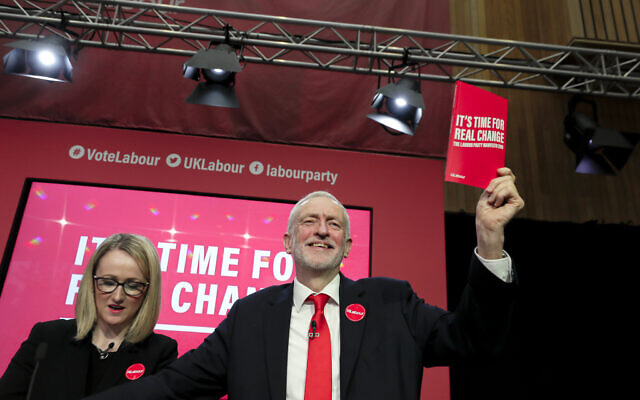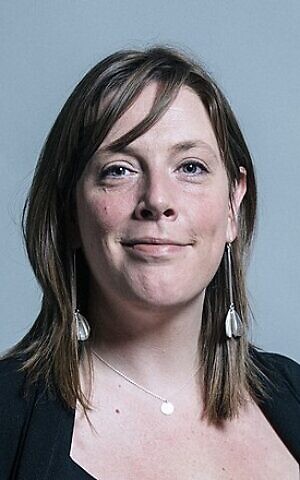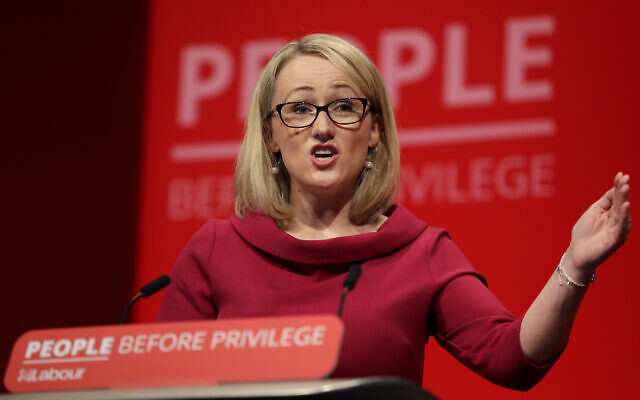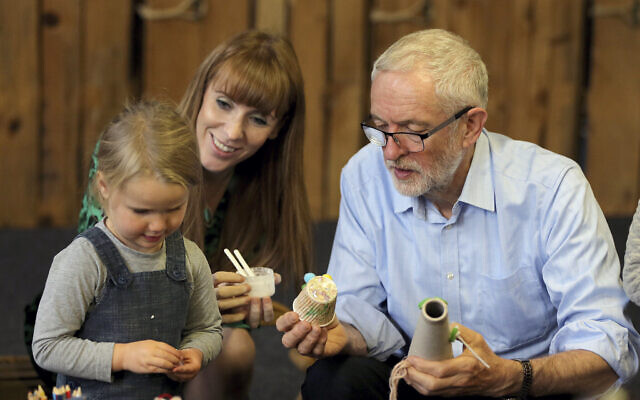Hard-left leader to stay in place until March, race expected to be bitter struggle over direction of party deeply divided over Brexit and beset by accusations of anti-Semitism

The UK Labour party has begun the process to elect a new leader to replace hard-left Jeremy Corbyn who took the party to its worst election defeat in decades amid the Brexit debate and widespread allegations of anti-Semitism in Labour.
The party confirmed on Sunday night that Corbyn had asked for the process to elect his successor be completed by March and the party’s general secretary, Jennie Formby, has written to the national executive committee to recommend the race begin on January 7, the Guardian reported.
The party is expected to have a new leader in place before England votes yet again in local polls in May.
A somber but combative Corbyn said Friday that he will step aside once Labour completes a period of “reflection” about its mistakes.
Yet the 70-year-old has no clear successor after a year of infighting between a protectionist old guard backed by the unions and more metropolitan members with pro-European views.
Corbyn signaled Sunday that he wanted to leave behind a legacy that keeps Labour’s focus on social spending and the re-nationalisation of private industries.
He came under bitter criticism from more moderate supporters Sunday for claiming that his policies were more popular than those pushed by Prime Minister Boris Johnson.
“I am proud that on austerity, on corporate power, on inequality and on the climate emergency we have won the arguments and rewritten the terms of political debate,” he wrote in a column in The Observer newspaper.
Several prominent Labour members who are viewed as potential leaders sharply disagreed.
“It’s time to try something different, rather than re-enacting old battles,” lawmaker Jess Phillips wrote in The Observer.
“Everywhere I campaign, I heard the same thing. It was less about Brexit and more about belief. In these places of generations of Labour voting, they did not believe a Labour government would or could deliver for them.”
The 38-year-old was elected to parliament in 2015 after a career working with refugees and victims of domestic violence. She soon became one of its most recognizable voices, with passionate and energetic performances delivered in her distinctive West Midlands accent.
She is no friend of Corbyn, having once joked she would “stab him in the front,” and would be an outsider to replace him.

But she is a canny media operator, being one of the party’s most visible MPs on Twitter and earning glowing profiles in newspapers from across the political spectrum.
Labour parliamentarian Lisa Nandy agreed that the party had “lost touch with the day-to-day… experience of many of the people we want to represent.”
Nandy told the BBC she is “seriously thinking about” running to become the party’s next leader.
Several other candidates are seen as disciples of Corbyn and John McDonnell, the shadow chancellor, who would likely keep Labour on its current course.
On Sunday, McDonnell and Richard Burgon, the shadow justice secretary backed long-term ally Rebecca Long-Bailey for the top job, the Guardian reported, making her a favorite, even though she has not openly declared her candidacy.
The 40-year-old Corbyn loyalist who has long been seen as his natural successor.
The daughter of a docker from Manchester, northwest England, Long-Bailey has the credentials to win back disaffected voters in the party’s traditional working-class heartlands, while maintaining the backing of Corbyn’s supporters.
But given the waning star of the veteran leftist, it is unclear how much influence he will have over the process.

Much could depend on whether the trade unions that prop up the party decide they want it to move towards the center in a bid to beat the Tories after such a crushing defeat.
Other likely candidates include Keir Starmer, Angela Rayner and Emily Thornberry.
Starmer, 57, would represent a shift back towards the center ground for the party.
A former director of public prosecutions in England and Wales, Starmer became an MP in 2015 and has served as shadow Brexit minister for three years, using his legal expertise to hold the government to account over its plans.
He is popular among the anti-Brexit and centrist factions of his party, but is less liked among those new members attracted to the party by Corbyn’s radicalism.
Rayner is a combative 39-year-old who served in Corbyn’s top team for three years after being elected in 2015, and describes herself as being part of Labour’s “soft-left” wing.

Her back story has won admirers: she left school at 16, pregnant and without any qualifications, but worked her way up to become a senior trade union official.
“People underestimate me,” Rayner told the Guardian in 2012. “I’m a pretty young woman, lots of red hair, and everyone expects me to be stupid when I walk into a meeting for the first time.”
Thornberry, 50, was Corbyn’s foreign affairs spokeswoman for two years, the outspoken MP has previously courted controversy but could be a popular choice among the party’s ‘Remain’ majority having been a vocal proponent of stopping Brexit.
Corbyn also apologized Sunday for waging the disastrous campaign that handed Prime Minister Boris Johnson a mandate to take the UK out of the EU next month.
But the veteran socialist defended his radical platform and blamed the media for helping to cause his century-old party’s worst finish since before World War II.
“I will make no bones about it. The election result on Thursday was a body blow for everyone who so desperately needs real change in our country,” Corbyn wrote in the Sunday Mirror newspaper.
“I wanted to unite the country that I love but I’m sorry that we came up short and I take my responsibility for it.”
But Corbyn made no mention of the anti-Semitism scandals that have rocked the party, and he claimed that his hard-line socialist agenda had, rather than turn away voters, “won the arguments and rewritten the terms of political debate.”
Britain’s chief rabbi had suggested anti-Semitism was a “new poison” within the party, which had been “sanctioned from the very top.” Corbyn failed to dampen the row during a television interview with the BBC, side-stepping repeated chances to apologize to Britain’s Jewish community.
Thursday’s snap general election turned into a re-run of the 2016 EU membership referendum in which Johnson championed the Brexit cause.
The Conservative party leader now commands an 80-vote majority in the 650-seat House of Commons — a margin last enjoyed by the late Tory icon Margaret Thatcher in the 1980s.
As reported by The Times of Israel
